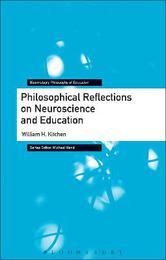
|
Philosophical Reflections on Neuroscience and Education
Paperback / softback
Main Details
| Title |
Philosophical Reflections on Neuroscience and Education
|
| Authors and Contributors |
By (author) William H. Kitchen
|
| Series | Bloomsbury Philosophy of Education |
|---|
| Physical Properties |
| Format:Paperback / softback | | Pages:264 | | Dimensions(mm): Height 234,Width 156 |
|
| ISBN/Barcode |
9781350110922
|
| Classifications | Dewey:370.1 |
|---|
| Audience | | Tertiary Education (US: College) | |
|---|
|
Publishing Details |
| Publisher |
Bloomsbury Publishing PLC
|
| Imprint |
Bloomsbury Academic
|
| Publication Date |
30 May 2019 |
| Publication Country |
United Kingdom
|
Description
Philosophical Reflections on Neuroscience and Education explores conceptual and normative questions about the recent programme which aims to underpin education with neuroscientific principles. By invoking philosophical ideas such as Bennett and Hacker's mereological fallacy, Wittgenstein's the first-person/third-person asymmetry principle and the notion of irreducible/constitutive uncertainty, William H. Kitchen offers a critique of the whole-sale adoption of neuroscience to education. He explores and reviews the role that neuroscience has started to play in educational policy and practice, and whether or not such a role is founded in coherent conceptual reasoning. Kitchen critically analyses the role which neuroscience can possibly play within educational discussions, and offers paradigmatic examples of how neuroscientific approaches have already found their way into educational practice and policy documents. By invoking the philosophical work primarily of Wittgenstein, he argues against the surge of neuroscientism within educational discourse and offers to clarify and elucidate core concepts in this area which are often misunderstood.
Author Biography
William H. Kitchen is a freelance educational researcher. He currently teaches mathematics at post-primary level in Northern Ireland, and has previously authored Authority and the Teacher (2014) with Bloomsbury.
ReviewsThis book is invaluable as an antidote to the current dangerous emphasis on brain-based education, with its seductive rhetoric. It is a relief to read Kitchen's thorough, thought-provoking and lucid scrutiny of the phenomenon! The book should be read by anyone committed to the deflation of myths that will otherwise affect millions of pupils, as well as teachers and educators at all levels. * Anita Norlund, Associate Professor of Education, University of Boras, Sweden *
|